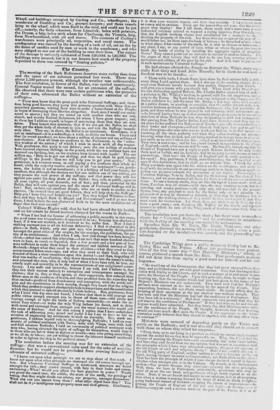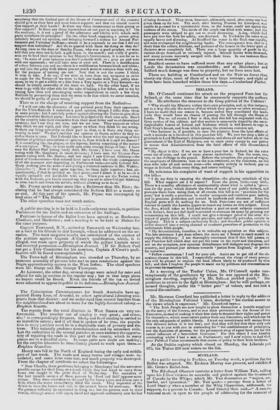The Cambridge Whigs gave it public dinner on Friday last
to Mr. - Spring Rice and Mr. Pryme. Allem 150 gentlemen were present. One of the first toasts was " fler Majesty's Ministers o" which, of course, produced a speech from Alr. Rice. That gelitleinan's modesty did not deter him from saying a good word for himself and his col- leagues— " He would say of the Government, that they had never swerved from their duty, and performed every act with good intentions. They hail discharged then duties with fidelity to the Crown, and in such a manner as to endeavour to pre- serve the liberties of the People. Upon this principle, then, he might without boasting say, that the reception which had just been given to the name of her Majesty's Ministers was not undeserved. They were told that her 31ajesty's advisers were rejected at the last election by the mass of the People. That imputation, however, did not obtain much credit. He would affirm that the boasting of their opponents at the last election was without scruple. They had been told that the Ministers had lost the confidence of Parliameut. Ilt they been left in a minority? Had their opponents ever proved that they did not deserve the confidence of Parliament? If they hail dime so, he and his col- leagues would have submitted. But they boast, too, that 'Ministers were with- out the confidence of the People. He thought, however, that that boasting would not have much effect upon the People. If the opponents to the .1■Iiiii- nistration really believed that they should be expelled, wily did they alloy them to continue?"
Ministers were accused of dependiug, partly on the Tories and partly on the Radicals ; and it was also said they should act in concert with those on whom they relied for support-
" First, then, as to our being in a position in which we cannot singly contend against the united forces that may be °mimed to us. Why, :41r, I a lee had the honour of meeting the People here—not cecasionally, but many times before; and have they ever heard from me any opinion that was not in ma:end:ince with the principles which I have ever advocated—namely, the good old opiuMos of the old friends of civil and religious liberty ? Have I not steadily adhered to the old Whig party of England, neither tending to what is Toryism on tie: eoe hand, having changed its name to Couservatisal, nor Radicalism on the other ? That has been the principle of which I have always declared myself in favour, whether when amongst you or in the Cabinet. illy ta leads in the Goveiument profess—they. profess because they entertain—precisely the same prieciples. Well, then, we have in Parliament, undualdeilly, geritlemen who stop far short of us on the one hand, and gentlemen who go much beyond us on the other. Now, if we are honest and sincere in our opinions, is it at all surprisiug that when a motion is coming forward far short of what we think is right_ going backward instead of forward—stopping the course of improvement—de- priving the People of England of the just and kgitheete eseeeip.mees of Reforun—suppose such a unction made on the pat of the louts, is it at all surprising that the Radical part of the House of Commons and of the country should give us their best and most honest support, and that we should receive that support at their hands ? Is there any thing inconsistent in their giving us that support? Is there any thing inconsistent on our part in receiving it? On the contrary, is it not a proof of the adherence and fidelity with which each party maintains its principles? On the other hand, supposing a person going infinitely beyond my opinion, and bringing forward a motion fur Annual Par- liaments and Universal Suffrage—would it be a reproach to me that I did not support that individual? Are we to quarrel with them for doing as they do? As long since as the days of Sancho Panza, who was a good prophet, we were told that you were not to look a gift-horse in the mouth; and really if gentle- men are to lend their opinions to her Majesty's Government, it is nut for us to say, In some of your opinions you don't coincide with us ; pray go and vote with our opponents ; we will have none of your aid. There is a modification of colour between you and us—there is a modification between black and white ; go and join the party with whom you are much more at variance than with me, for the purpose of turning me out.' Now that is not the course I think it wise to take. I do say, if we were to have done any measures in order to angle for the Tories—if we were to bait our hooks with bad, paltry mea- sures, to try to get a nibble or a bite from a Tory squire or a Tory baronet—we should be utterly unworthy of the trust we hold. On the other hand, if we were to go with the other side for the sake of taking a few fishes, and to try by raising false ideas and encouraging undue expectations to catch a few stray Radicals by persuading them that we mean to do that which we never intended, we should be guilty of great wrong."
Then as to the charge of receiving support from the Radicals- " I will not take the character of any political party from their opponents. For the Ultra-Radicals I entertain a good opinion, though I differ from them in some points; but I certainly protest against allowing the Tories to give their characters of the Radical party. Let them be judged of by their own acts. Don't let the country take their characters from their most bitter and mostdetermined enemies; but I say they are true, and we are true. They support us when they thiuk we are right, and they oppose us when they think we are wrong. Is there any thing unworthy on their part in that, or is there any thing un- worthy in ours? We don't sacrifice our opinion to theirs, neither do they sa- crifice theirs to ours. But I should like to know what the real meaning of this doctrine of political associations of opinion is, from which it is said we dissent ? It is something like the plague, or the leprosy, having something of the nature of a contagion. Why, we have really seen some strange things of late: I have seen Sir Robert Peel voting lately with Mr. Grote ; I have seen Mr. Hume voting with Mr. Goulburn in small divisions ; I have seen Sir Thomas Free. mantle voting with Mr. Hawes; and last night I saw Colonel Sibthorp—the jewel of Conservatism—that colossal Lead upon which the whole consequences of all the measures now depending in Parliament turn—actually Colonel Sib- thorp rushing into the arms of and giving a fraternal embrace to Mr. Wakley. (Lamp/der!) Now if they agree together, let them fight together ; but, un- questionably, if that be justified on their parts—and I admit it to be so—it is equally excusable and ,justifiable with us. When you see the Tories voting with the Radicals, you surely cannot say that you are to allow Colonel Sibthorp to cross halals and down the middle, without allowing us to do so."
Mr. Pry me spoke rather more like a Reformer than Mr. Rice; de- claring that he had always considered the Reform Bill as a means to an end. At this part of his speech, Mr. Pryme was interrupted by loud cries of" The Ballot."
The other speeches were not worth notice.



























 Previous page
Previous page